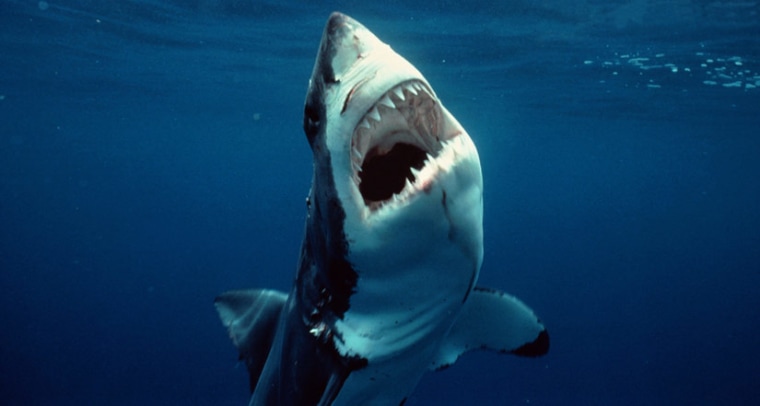Teenage great white sharks often literally bite more than they can chew, according to a new study. The research helps to explain why these sharks sometimes attack victims and then quickly swim away.
The study, published in the Journal of Biomechanics, determined that the jaws of teenage great white sharks are likely too weak to capture and kill large marine mammals and humans.
That doesn't stop them from trying, though.
"There is certainly observational evidence demonstrating that juveniles will make a few exploratory bites but then wait for larger individuals to bite through the tougher part of big carcasses, such as those of baleen whales, before biting into the softer exposed flesh," co-author Stephen Wroe told Discovery News.
Wroe, head of the Computational Biomechanics Research Group at the University of New South Wales, and his colleagues made the discovery after examining the feeding behavior of a harmless grey nurse shark and a teenage great white shark that measured just over eight feet long. The latter was big enough to do some damage, but not yet fully-grown, as adult great whites measure closer to 10 feet in length or more.
The study was the first of its kind to use sophisticated 3-D computer models and advanced engineering techniques to examine how these two threatened sharks hunt and kill prey.
The grey nurse sharks were found to be spring-loaded for rapid strikes on small, fast-moving fish. Prior data on adult great whites and the new information on the teenage shark in the study show that great whites are better suited for a powerful bite on prey ranging in size from small fish to large marine mammals.
The jaw of the more adolescent shark, however, hadn't developed enough stiff mineralized cartilage to resist the forces involved in big bites. For adults, this cartilage allows the direction of forces applied by the shark to remain near perpendicular to the chomping point, maximizing the bite's efficiency across a wide range of gapes, Wroe explained.
Teenage great whites, just under the age of 10, also cannot risk losing too many teeth.
"So at this juvenile stage the animal is testing itself, trying to learn what it can and cannot do," he said. "Sensors in the jaws give feedback, but we do not know precisely why any individual shark makes a decision on whether to go through with a kill or whether to decide that discretion may be the better part of valor."
Nevertheless, even the teenage great white shark in the study generated over 661 pounds of biting force.
"Great whites come out fighting," he said. "They are born well developed and must fend for themselves from day one."
It's a tough shark-eat-shark youth, since young great white sharks will often eat one or more of their siblings, as well as filling up on other fish. If a great white manages to reach adulthood, the researchers estimate that its bite could skyrocket to close to 4,000 pounds of bone-crushing force.
Vic Peddemors of the New South Wales Cronulla Fisheries Research Center of Excellence believes the study could help to explain "why many of the shark attacks off NSW are aborted after a single exploratory bite, as the great whites involved are usually juveniles that might sustain jaw injury if they persevered with the attack."
Lead author of the study Toni Ferrara, a University of New South Wales doctoral student, refers to these young sharks as "awkward teenagers" that aren't very successful hunters at this stage.
"It seems paradoxical that the iconic jaws of great white sharks, made infamous by the classic Steven Spielberg movie 'Jaws,' are actually rather vulnerable when these sharks are young," she said. "Great white sharks are not born super-predators. They take years to become formidable hunters."
